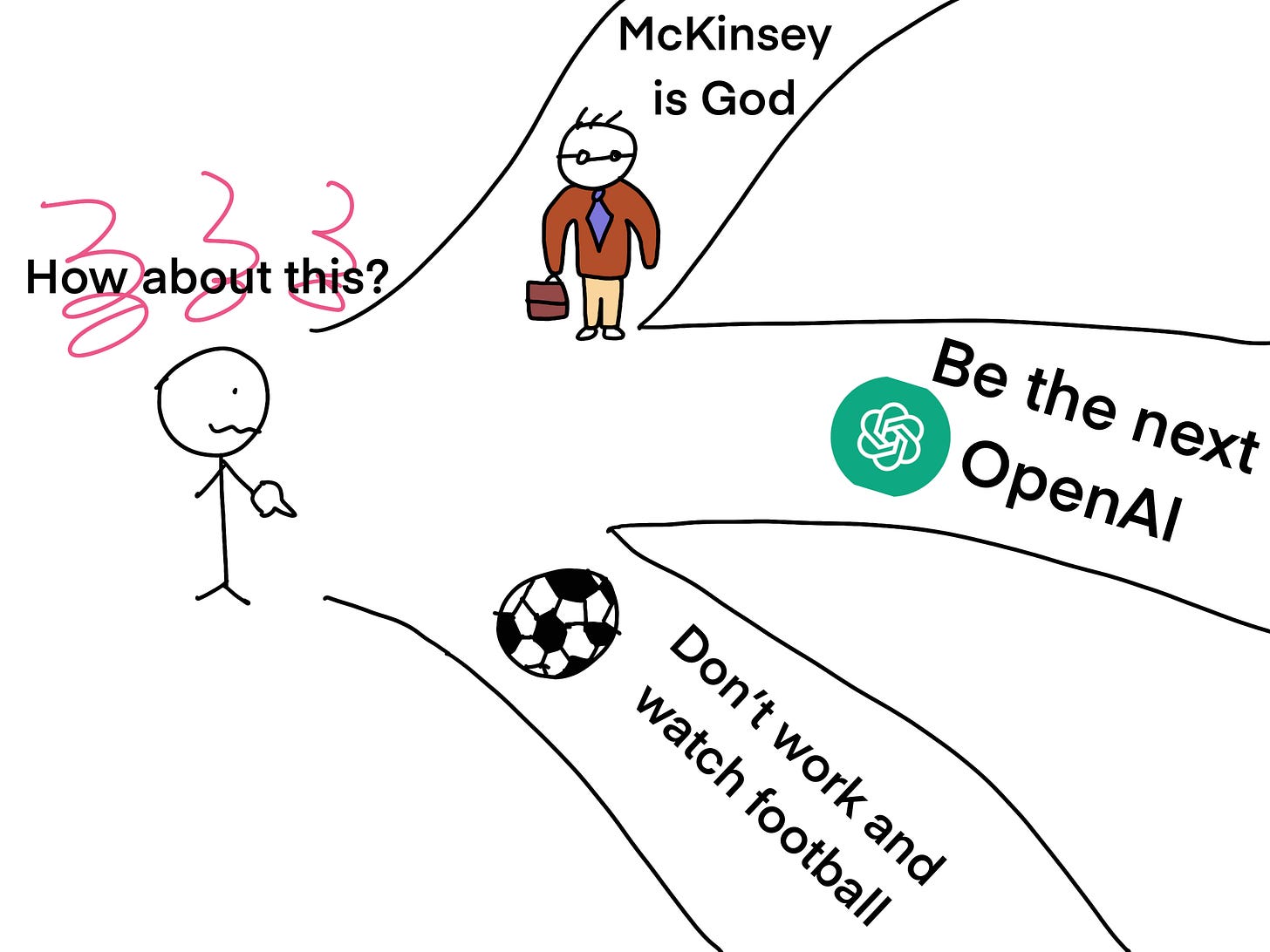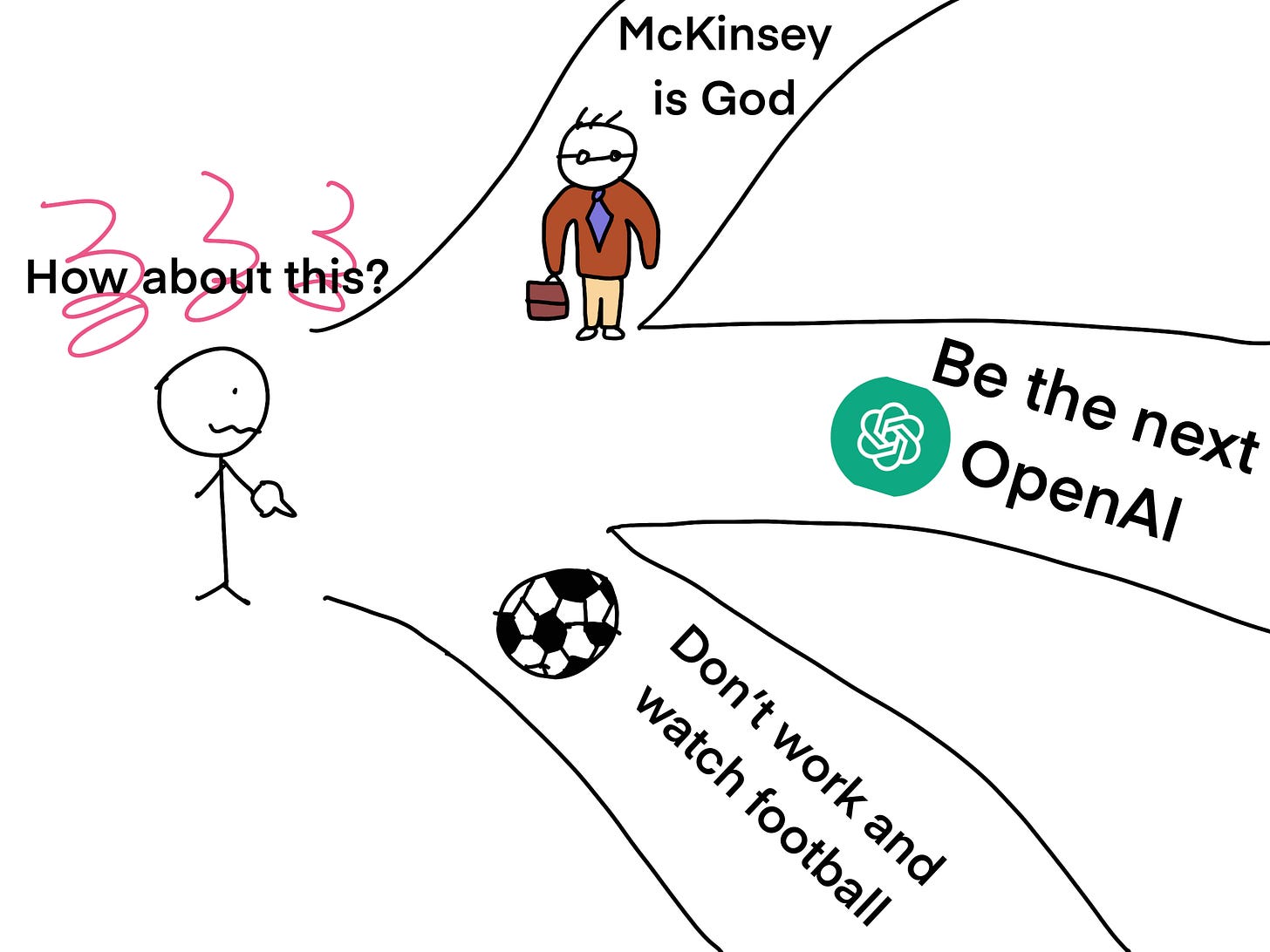教育不是批判性思考,而是創造可能性
Education is not about critical thinking; it's about creating possibilities.
我認為優質的教育,重點不在於教導批判思考、創造力、溝通合作,而是創造的可能性。
最近和班上的 Youtuber 說我們公司最近 instagram 行銷有好幾的 Millon 的人看了,最高的甚至有 33M,他大吃一驚,我只心想「哎呀,我們年收怎麼還是這麼少 XD」的時候,我才注意到環境已經重塑我對可能性的定義。
譬如,公司最近上了一個 pitch podcast,現場的投資人口頭表達有興趣帶領我們 1M 的融資,原本我腦海裡對融資的方法就有多了一條路徑,這就是可能性。而一個好的學習環境,要能帶領人拓展他對於可能性的定義。舉融資來說,我看過了隔壁同桌的公司只是去喝了一杯咖啡融了 3M,看了 YC 朋友兩周 demo day 輕鬆融完好幾 M,這就已經是三種融資的路徑了,於是融資就逐漸在我的腦袋裡,從,這輩子哪有個跟陌生人要一百萬呀,太奇怪了吧!變成,原來這樣也可以和陌生人要一百萬呀!如果看久了,說不一定就換我去要一百萬了,從不可能變成說不定,從說不定變成這樣可能有機會而去嘗試,就是創造可能性。
為什麼我覺得這件事比 21 世紀的批判思考等能力還重要呢?雖然這些能力有助於人挑戰自己的思考框架,但那框架會被宥限於區域極大值而不是絕對極大值。像是在台大的我可能覺得最有批判性能力的人,就是進去管顧公司,限制於台灣,就是區域極大值。如果你問我,那你覺得你可以去 Meta 美國總部工作嗎?我會告訴你,哪有可能,這輩子認識最厲害的人都沒有去過!但到了 Minerva 看到隔壁老師問問題一問一問三不知的同學都進了,就會覺得哪有不可能,這就是可能性的創造。而這件事的關鍵因素,不在於個體能力,而在於環境引領的可能性。
而這對於我也給予我重新定義「好的生活」的機會,像是常見到來這裡的台灣人崇敬能進去美國大司的人,拼命想來讀研究所,回台灣就是輸家,但矽谷的 ai 新創則對大公司嗤之以鼻,覺得奮力工作,成為下一家 Open ai 才是王道,這些都只是其中一種社會所編織給我們的故事,並沒有絕對的優勝劣敗,好與不好,端看個人的合適性。即便再聰明、再有批判性思考的人可能都當局者迷,而當我看見舊金山社會的故事,我的第一個反應不是,「天啊!大家一週都工作 100 小時,我來不及了!」而是,「等等,我之前在阿根廷大家都不工作,天天跳舞看足球,好像也很快樂呢!」這就是可能性帶來的批判性思考,也是我認為 Minerva 旅行教育的可貴之處,想要努力工作只是當下更有意識的一個選擇,而不是單純趨之若鶩、尋求社會認可。
因此我覺得好的教育如果要帶來多元面向的成長,完全不會只是技術、知識、或是思考方式上的。可惜大學教育已經成為追求社會認可的招牌了。我想,讓人看見自己有所選擇,發掘自己從來不敢想像的潛力,知道如何創造,為自己寫下獨特的故事,才是教育的意義。
那至於怎麼做,還得再想想呢!
P.S. 寫下這篇的時候,我發現自己對於台灣教育的情感也有所變化,台大輟學前,只憤怒地想:「天啊,這個教育怎麼都把我們變成複製人!」輟學後出台灣的好幾年後後想:「幸好逃出來了,雖然可以為自己帶來改變,但根本不敢想像改變這惡劣的環境,一定找不到願意相信我的人,超恐怖又超難,大家一定覺得我是瘋子,感覺三天陣亡。」寫完這篇時想:「確實還是很難、好可怕,但要對 Esther 有些耐心呢,看來他已經在找方法了 :) 」
I believe that quality education isn't just about teaching critical thinking, creativity, or communication and collaboration skills; it's about creating possibilities.
Recently, I was talking with a YouTuber in my class about our company's Instagram marketing, which has recently reached millions of viewers, with the highest number being 33 million. She was amazed, and in that moment, I thought to myself, "Oh, how come our annual revenue is still so low? XD" It was then that I realized how much my definition of possibilities has been reshaped by my environment.
For example, our company recently participated in a pitch podcast, and the investors verbally expressed interest in leading a $1 million funding round for us. Suddenly, my mind expanded with a new path for fundraising. This is possibility. A good learning environment should help people expand their definitions of what's possible. Take fundraising, for example. I've seen a company next to me raise $3 million just by having a coffee, and I've watched friends from Y Combinator raise millions after just two weeks of Demo Day. These are already three different paths to raising funds. Now, fundraising no longer seems like something completely impossible. At first, I thought, "How could I possibly ask a stranger for a million dollars? That’s so weird!" But now I think, "Oh, this is actually how you ask strangers for a million dollars!" And if I keep observing, maybe someday I'll be the one asking for a million dollars. What once seemed impossible has become "maybe," and from there, it becomes an opportunity worth trying. That's how we create possibilities.
So why do I think this is more important than the skills of critical thinking and other 21st-century abilities? While those skills help challenge our thought frameworks, they can still limit us to local maxima rather than global maxima. For example, when I was at National Taiwan University, I might have thought the most critically capable person was someone who went into a consulting firm—limited to the context of Taiwan. If you’d asked me if I could work at Meta’s headquarters in the U.S., I would have said, "No way, none of the smartest people I know have ever been there!" But when I went to Minerva and saw classmates—who were constantly asking questions and didn't seem to know much—getting in, I thought, "Why not?" That’s the creation of possibility. And the key here isn't individual ability, but the environment that guides and opens up those possibilities.
This also gave me the chance to redefine what a "good life" is. I often see Taiwanese people who admire those who work at top American companies and desperately want to attend graduate school, believing that returning to Taiwan means failure. On the other hand, the AI startup scene in Silicon Valley scoffs at big corporations, believing that working hard to become the next OpenAI is the true path to success. These are just some of the stories society weaves for us. There’s no absolute right or wrong, good or bad—it all depends on what fits you personally. Even the smartest and most critically thinking people can be trapped in their own perspectives. When I see the story of San Francisco society, my first reaction isn't, "Oh no! They work 100 hours a week, I’m falling behind!" Instead, it’s, "Wait a minute, back in Argentina, people didn’t work, they just danced and watched soccer, and they seemed pretty happy!" That’s critical thinking enabled by the creation of possibilities. This is also what makes Minerva’s global rotation valuable. Wanting to work hard becomes a conscious choice, not just a blind pursuit of societal recognition.
Therefore, I believe that good education, if it is to lead to growth in multiple dimensions, cannot be just about skills, knowledge, or ways of thinking. Unfortunately, university education has become a badge of societal approval. I think education should help people realize that they have choices, discover potential they never dared to imagine, learn how to create, and write their own unique stories.
As for how to do this, I still have to think more…
P.S. As I was writing this, I realized that my feelings towards Taiwanese education have also shifted. Before I dropped out of NTU, I was just angrily thinking, "Oh my god, this education system is turning us into robots!" After leaving Taiwan for several years, I thought, "Thank goodness I escaped. Although it brought change for me, I couldn't even imagine changing such a harsh environment. No one would believe in me, it would be terrifying and so hard. Everyone would think I'm crazy, and I’d probably fail within three days." But as I finish this, I think, "Yes, it’s still hard and scary, but I need to be patient with Esther. It looks like she’s already finding a way. She has possibilities :)"



